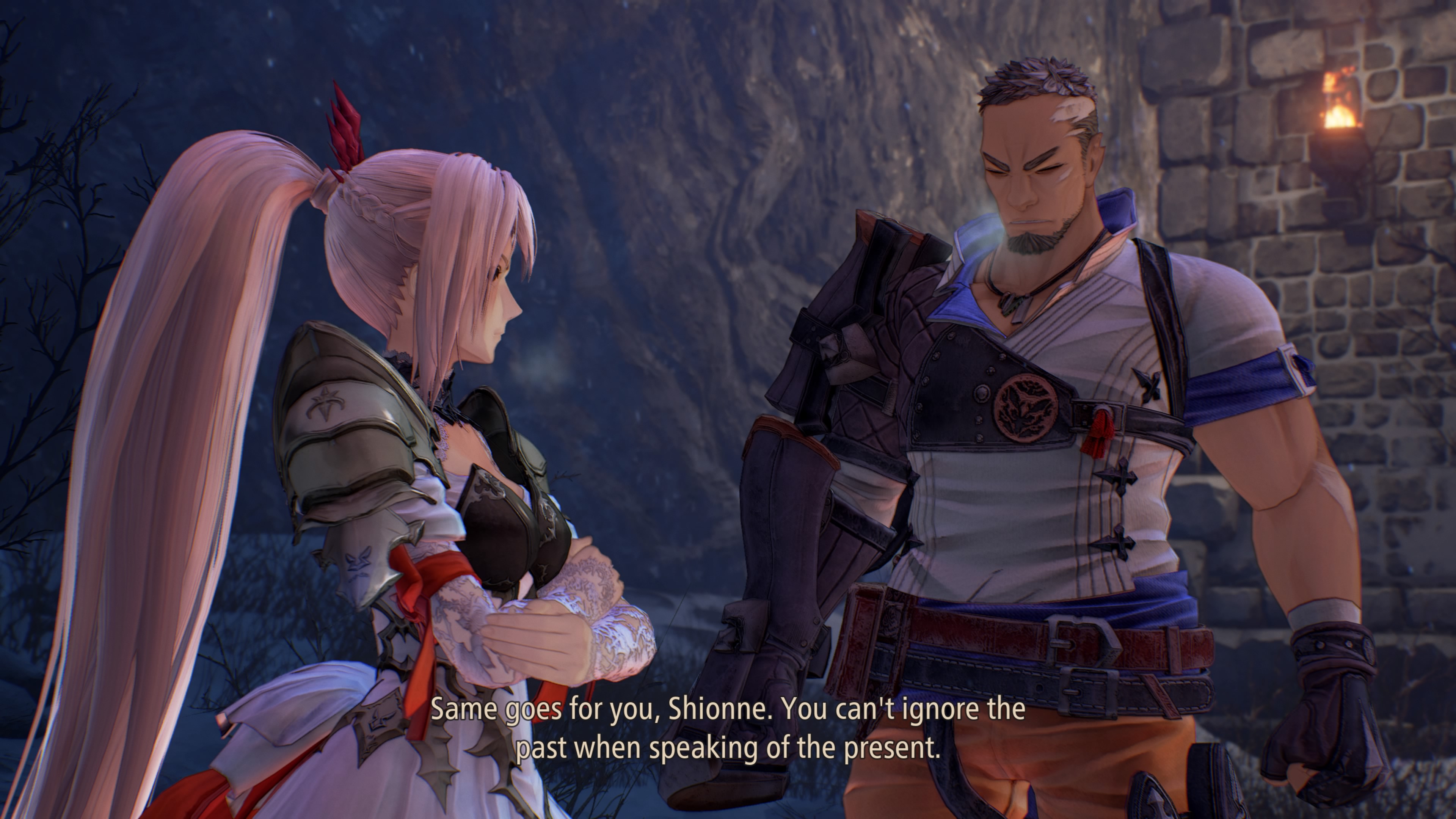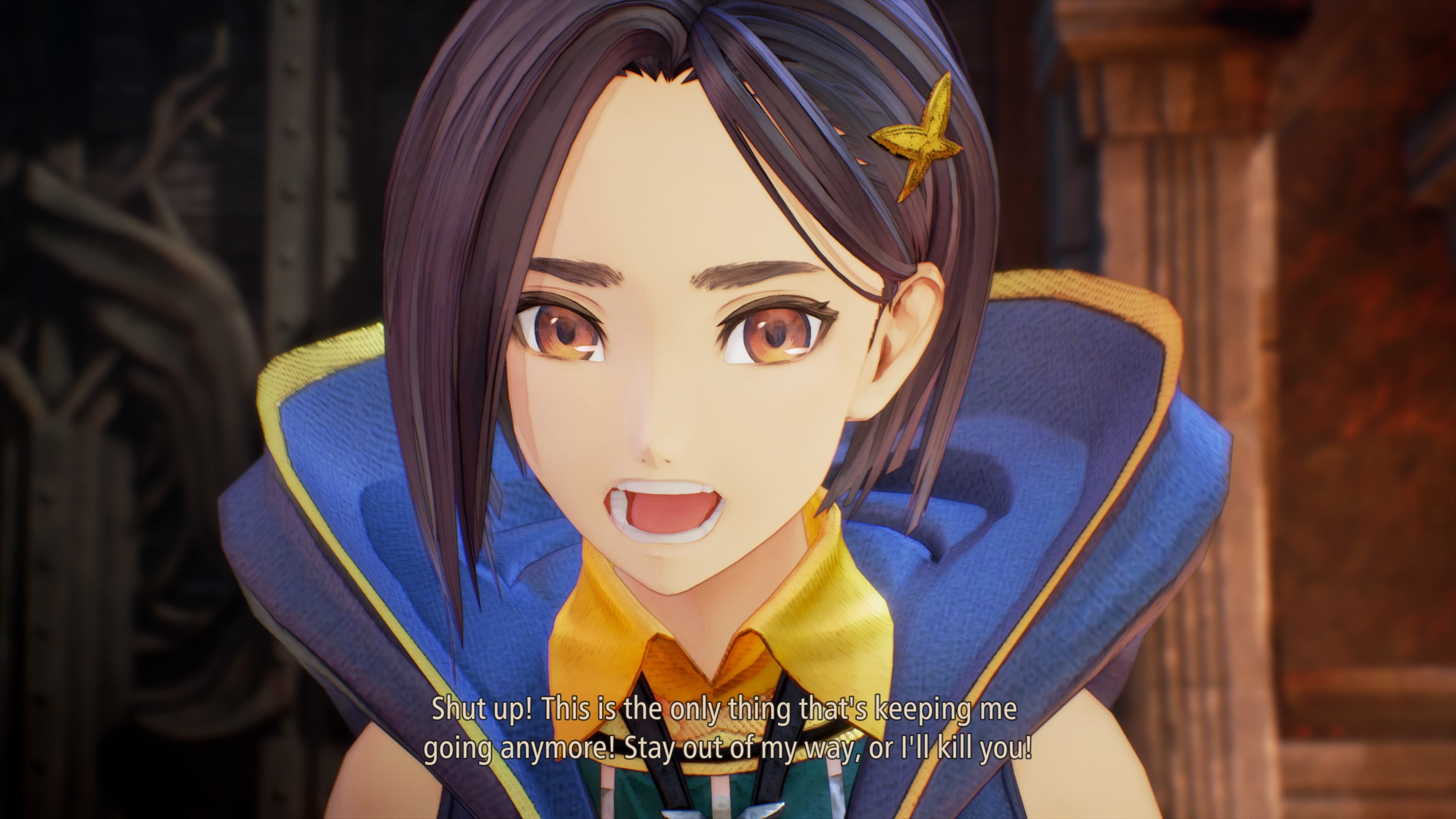A fight rages at the top of a misshapen stone fortress, brutally carved from the rocks by slave labor. Suddenly, a beam of living fire blazes up to the sky, and an amnesiac hero cries out his name in triumph as he vanquishes his despicable enemy.
Big battles, pointy-haired and forgetful heroes, nations themed around the elements — sounds like your usual RPG fare, right? Not even close. Tales of Arise is far from your standard RPG, let alone your typical Tales game. It’s a strong, even daring, reimagining of the series and one of the year’s best RPGs.
Tales of Arise Review: Liberate Thyself
The clue is in the name, but Tales of Arise is about rebellion, or more accurately, it’s about several rebellions. Not just the big political kind either, though those certainly play a prominent role.
The twin worlds of Rena and Dahna once lived in harmony — or perhaps the existence wasn’t quite so harmonious, though that’s for you to find out later — until 300 years before Arise takes place. The Renans developed a satellite planet and military base called Lenegis, from where they launched an invasion on Dahna, conquering its people, erasing its past, and bending even the planet’s foundations to their will.
No one can stay oppressed forever, though.
Rebelling against corrupt governments is hardly unique. For most RPGs, however, simply defeating the villain or installing a beneficent ruler is enough. However, Tales of Arise answers the question, “What if a historian, political theorist, and social scientist made a video game?”
It picks up where most RPGs leave off, and the nations of Dahna are essentially anime case studies in slavery theory, revolution, and imperialism, often drawn from evident and uncomfortable real-world parallels.
One region is unmistakably based on Stalin’s U.S.S.R. and the paranoid self-destruction his oppressive regime fostered. Another region seems like a utopia, where benevolent Renans live happily alongside enslaved Dahnans in a world built on Enlightenment-era philosophies of equality.
Yet no amount of idealism can obscure the condescending paternalism inherent in those philosophies and the reluctant lord responsible for implementing them.
Arise doesn’t stop there. It follows through on every theme, with only a few exceptions, and it’s not content to settle for easy, black and white answers to difficult questions either.
It also inverts RPG tropes at points — the reason why a specific element characterizes each region stands out in particular — but more than that, Arise inverts Tales itself.
Tales builds elaborate worlds with more fancy fantasy names, wars, and official occupations than most people can remember, and often does very little with them. And that’s fine! Tales of the Abyss is one of the series’ most egregious examples of that style, but it’s also still one of the strongest narratives, despite the unnecessary complexity.
Arise strips those layers away and focuses on the core themes it wants to explore, which evolve naturally from this point.
That more refined focus extends to characters as well. Tales normally has roles to fill, such as the sassy prodigy or the raunchy older man, and almost any character could fill these roles with a few tweaks in writing. And that’s also fine! There’s value in adjusting the familiar, but Arise is proof Bandai took its commitment to a new start for the franchise seriously.
It has people who sometimes fall into types, but who mostly shape the story with their foibles, desires, and experiences. Whether child or adult, they’re quite sad people. Tales of Arise isn’t quite “if Yoko Taro wrote Tales,” but it’s close.
You’ll still find the series’ usual lightheartedness scattered throughout, especially in skits and most things Hootle-related. However, it is primarily a serious story, as it should be considering the themes Arise explores. It dips into melodrama occasionally, as most RPGs do, though Arise earns its sadness.
How much you end up agreeing with this will likely vary. Pacing is one of the biggest risks Bandai took with Arise, and this too is a no-fluff area. That means Arise leaves some key parts of its depth, such as the aftermath of rebellion, to the imagination while Alphen and the party forge ahead on their mission of liberation.
I can see how some might consider this a more shallow approach to world-building, but it works in the context of Arise’s story. However, Bandai can’t get away with it a second time. Tales of Arise sets a new standard for the series’ storytelling, and, in the absence of DLC expanding on that for Arise, it’s something future Tales installments will need to surpass, including the realm of character development.
Skits further character depth, and the new camping feature opens chances to learn even more about party members at certain times. However, there’s little time for interactions unrelated to the main story.
Some long-time fans might see this as a detriment. One of the series’ unique characteristics is building a strong party dynamic through scenes that often have little relevance to the actual plot. Alphen’s party is a genuine ragtag band, though, and as with most such groups, dedication to their mission unites them more than anything else at first.
It’s a different approach, but one that makes the party’s bonds feel stronger in the end. When Alphen tries convincing one of them that they are genuinely friends, not just comrades working together, you believe him and feel the weight of his convictions. How could you not, after everything they’ve endured up to that point?

RPGs often trade strong production values for good writing and a more thorough approach to storytelling, but Arise is blessed with both. Superb voice acting, fluid and expressive character models, and an epic score enhance Arise’s core strengths, as do its graphics.
There are a few minor hiccups. Arise suffers from some texture pop-in at times, especially in areas with numerous rock formations, but NPCs and non-voiced dialogue are the only standout issue here.
It also recycles NPC models heavily. Quest dialogue uses sound bytes instead of full voice acting, which leads to some unintentionally amusing and sometimes mildly disturbing situations when the byte doesn’t match the scenario at all. Village Man’s unhinged laughter on hearing Alphen solved his problem may haunt my dreams forevermore.
Every Tales entry intended as a milestone overhauls the combat in some way, and Arise is no different, applying its more thoughtful approach to storytelling here as well. Every party member has their usual set of standard attacks and artes, plus a perk that augments normal attacks. Rinwell the mage, for example, can stop a spell, charge it, then stack it with another one to access high-tier magic well before she learns it.
Each character has a boost gauge as well, special interrupt attacks that deal heavy damage to certain enemy types or help contain specific threats.
Then there’s evade counters, overlimits and unique artes attached to that state, and flashy moves executed with another character if you string together enough hits in a combo.

Enemy variations might be few in Arise, though balancing attacks, boosts, and combos means no encounter is dull. Button mashing won’t get you far, and that goes double for Arise’s spectacular bosses. A new approach to healing makes you think twice about your party’s strategies, too. Healing artes are tied to a point system that depletes after every recovery arte, so planning is important.
You’ll learn new artes and passive abilities through the title system, which is a first for the series. Titles are the skill tree in Arise. Earning a new one unlocks five new abilities, and buying each in a title grants a permanent buff of some kind.
The skill tree also tells you what’s needed for unlocking adjacent panels. It’s both a much more convenient approach to title hunting than usual and a powerful incentive to explore as much of Arise as possible.
That’s true for Dahna’s huge, beautiful realms as well. There’s technically not much to do outside of towns, but scouring the land for ingredients, recipes, and equipment makes taking detours worth the time. Between that and the splendid visuals, Bandai finally has its world design back on track after losing its way with Zestiria.
One of the pacing’s victims that’s impossible to ignore is farming. Despite featuring prominently in Arise’s marketing, farming is a slightly brutal footnote in your journey. You’ll stuff a barn with animals after acquiring it in the third realm, and… that’s it. Raise, consume, repeat.
You can’t even interact with the animals or just raise them for snuggles or to keep them safe. Maybe Bandai was just preparing for an Animal Farm-style sequel, but it’s a bit of an odd inclusion.
Tales of Arise Review — The Bottom Line
Pros
- Thoughtful story that breaks new ground for how RPGs handle politics
- Fresh, effective approach to pacing and story delivery
- Strong and sympathetic cast
- High production values
- Engrossing and smart combat
- Hootle
Cons
- Recycled NPCs and annoying sound bytes
- Farming
Bandai wanted a new start with Tales of Arise, and the team surpassed itself. The risks of telling a new kind of story — and in a completely new way — paid off. It’s not just one of the best Tales games, though it’s certainly that. Arise is easily one of the strongest RPGs in recent years.
[Note: Bandai Namco provided the copy of Tales of Arise used for this review.]










Published: Sep 8, 2021 09:11 am